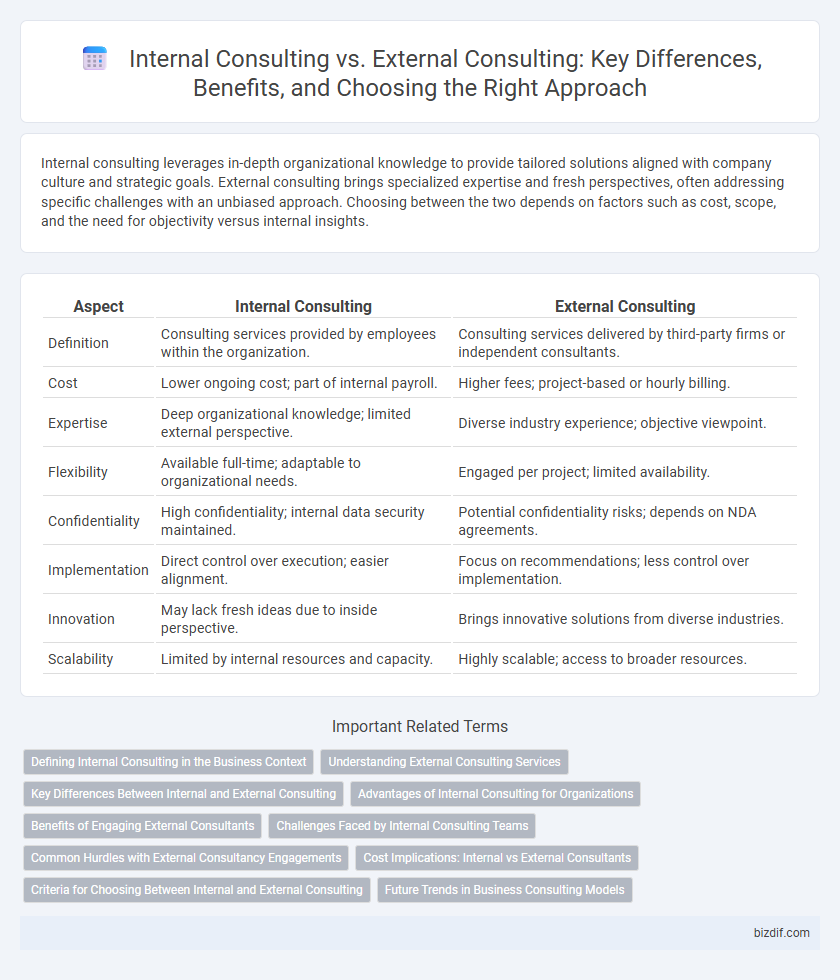Internal consulting leverages in-depth organizational knowledge to provide tailored solutions aligned with company culture and strategic goals. External consulting brings specialized expertise and fresh perspectives, often addressing specific challenges with an unbiased approach. Choosing between the two depends on factors such as cost, scope, and the need for objectivity versus internal insights.
Table of Comparison
| Aspect | Internal Consulting | External Consulting |
|---|---|---|
| Definition | Consulting services provided by employees within the organization. | Consulting services delivered by third-party firms or independent consultants. |
| Cost | Lower ongoing cost; part of internal payroll. | Higher fees; project-based or hourly billing. |
| Expertise | Deep organizational knowledge; limited external perspective. | Diverse industry experience; objective viewpoint. |
| Flexibility | Available full-time; adaptable to organizational needs. | Engaged per project; limited availability. |
| Confidentiality | High confidentiality; internal data security maintained. | Potential confidentiality risks; depends on NDA agreements. |
| Implementation | Direct control over execution; easier alignment. | Focus on recommendations; less control over implementation. |
| Innovation | May lack fresh ideas due to inside perspective. | Brings innovative solutions from diverse industries. |
| Scalability | Limited by internal resources and capacity. | Highly scalable; access to broader resources. |
Defining Internal Consulting in the Business Context
Internal consulting involves leveraging experienced professionals within an organization to provide expert advice and strategic solutions tailored specifically to the company's culture, processes, and goals. These consultants work closely with internal stakeholders to identify operational inefficiencies, drive change management, and optimize business performance without the need for external engagement. By utilizing in-house expertise, internal consulting fosters deeper organizational knowledge and faster implementation of tailored strategies.
Understanding External Consulting Services
External consulting services provide specialized expertise and objective insights that internal teams may lack, enabling organizations to address complex challenges with innovative solutions. These consultants bring industry best practices, benchmark data, and a fresh perspective to optimize business processes, strategic planning, and change management. Their independent position facilitates unbiased recommendations crucial for driving transformation and achieving sustainable competitive advantages.
Key Differences Between Internal and External Consulting
Internal consulting involves professionals embedded within an organization, providing ongoing, in-depth knowledge of company culture, processes, and challenges. External consulting offers specialized expertise and objective insights, often addressing specific projects or problems with a fresh perspective. Key differences include access to company data, cost structures, stakeholder relationships, and the level of long-term commitment to the organization's success.
Advantages of Internal Consulting for Organizations
Internal consulting offers organizations in-depth knowledge of company culture and processes, enabling tailored solutions that align closely with strategic goals. It fosters faster decision-making and implementation due to proximity and ongoing collaboration with internal stakeholders. Cost efficiency and enhanced trust further strengthen internal teams' ability to drive sustainable change effectively.
Benefits of Engaging External Consultants
Engaging external consultants provides access to specialized expertise and industry best practices that may not be available within internal teams. External consultants offer objectivity and unbiased perspectives, enabling more effective problem-solving and strategic decision-making. Utilizing external consultants can accelerate project timelines and introduce innovative solutions through their broad experience across multiple organizations.
Challenges Faced by Internal Consulting Teams
Internal consulting teams frequently encounter challenges such as limited resources, organizational resistance, and difficulty maintaining objectivity within the company culture. Navigating internal politics and aligning consulting initiatives with diverse departmental goals often hinders project momentum and impact. These factors contribute to the complexity of delivering effective solutions compared to external consulting firms with broader industry experience and dedicated focus.
Common Hurdles with External Consultancy Engagements
External consultancy engagements often face challenges such as misaligned objectives between the consulting firm and the client organization, leading to inefficiencies in project delivery. Limited organizational knowledge and cultural differences can hinder the consultant's ability to implement tailored solutions effectively. High costs and dependency on external expertise frequently result in reduced autonomy and internal capability development within the client company.
Cost Implications: Internal vs External Consultants
Internal consulting typically involves fixed costs related to salaries, benefits, and training, often resulting in lower short-term expenses but higher long-term overhead. External consultants demand premium fees, hourly rates, or project-based payments, which can lead to significant upfront costs but flexible, specialized expertise and short-term engagement. Cost implications depend on project scope, duration, and organizational capacity, making internal consultants more economical for continuous improvement and external consultants preferable for niche skills or temporary projects.
Criteria for Choosing Between Internal and External Consulting
Choosing between internal and external consulting hinges on factors such as organizational knowledge, cost, and confidentiality requirements. Internal consultants offer deep company insight and faster integration, while external consultants provide specialized expertise and unbiased perspectives for complex challenges. Evaluating project scope, budget constraints, and the need for objectivity ensures alignment with strategic goals and resource availability.
Future Trends in Business Consulting Models
Internal consulting is increasingly leveraging data analytics and artificial intelligence to drive strategic decision-making within organizations, enhancing agility and cost efficiency. External consulting firms are evolving by offering hybrid models that combine remote advisory services with on-site expertise, integrating digital platforms to improve client collaboration and scalability. Future trends indicate a convergence where both internal and external consultants emphasize sustainable business practices and customized, technology-driven solutions to address complex market challenges.
Internal Consulting vs External Consulting Infographic

 bizdif.com
bizdif.com